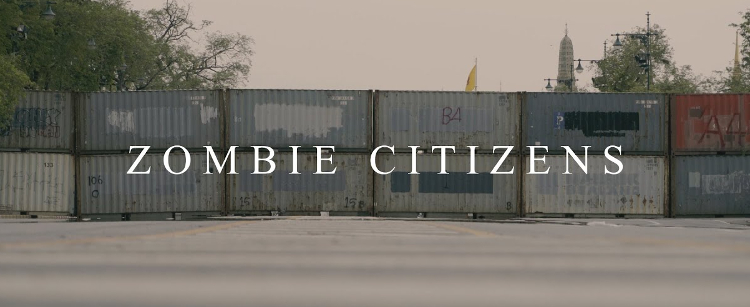
Weerapat Sakolvaree’s short documentary Zombie Citizens, like his earlier film Nostalgia, links the recent student protest movement with Thailand’s violent political history. Zombie Citizens begins with captions explaining that a Free Youth march on 7th August 2021 was rerouted after roads leading to the Grand Palace were blocked with shipping containers. Weerapat also filmed at Thammasat University on 6th October 2021, the 45th anniversary of a massacre that took place on the campus in 1976.
When Free Youth were denied entry to the Grand Palace grounds, they marched instead to Prime Minister Prayut Chan-o-cha’s residence, and riot police fired rubber bullets to disperse them. Zombie Citizens doesn’t document the violent clashes between protesters and police; instead, the film is eerily quiet, as the shipping containers block any traffic and the roads are almost deserted. The title hints at the state’s attitude towards the protesters, as shipping containers were also used to prevent zombie attacks in World War Z.
Shots of the Royal Hotel evoke another violent episode, the 1992 ‘Black May’ massacre, when the hotel lobby was used as a makeshift field hospital. The hotel and the university campus have become what Dutch artist Armando called ‘guilty landscapes’, bearing silent witness to past violence. Taiki Sakpisit’s short film A Ripe Volcano (ภูเขาไฟพิโรธ) and Thunska Pansittivorakul’s documentary Homogeneous, Empty Time (สุญกาล) also include sequences filmed at the Royal Hotel, again alluding to ‘Black May’.
A few minutes before it finishes, Zombie Citizens switches into reverse. The film runs backwards — a metaphor for the regressive, cyclical nature of Thai politics? — and View from the Bus Tour’s single Sun Rises When Day Breaks (ลิ่วล้อ) plays on the soundtrack. (The song was released on the forty-fifth anniversary of the Thammasat massacre.)
Nostalgia ended with a shot of the Ananta Samakhom Throne Hall seen from behind iron railings, after the building was closed to the public by royal decree. Similarly, Zombie Citizens shows Sanam Luang through barbed wire and the Grand Palace glimpsed from behind shipping containers. The state has battened down the hatches, and this is perhaps the calm before the storm.
When Free Youth were denied entry to the Grand Palace grounds, they marched instead to Prime Minister Prayut Chan-o-cha’s residence, and riot police fired rubber bullets to disperse them. Zombie Citizens doesn’t document the violent clashes between protesters and police; instead, the film is eerily quiet, as the shipping containers block any traffic and the roads are almost deserted. The title hints at the state’s attitude towards the protesters, as shipping containers were also used to prevent zombie attacks in World War Z.
Shots of the Royal Hotel evoke another violent episode, the 1992 ‘Black May’ massacre, when the hotel lobby was used as a makeshift field hospital. The hotel and the university campus have become what Dutch artist Armando called ‘guilty landscapes’, bearing silent witness to past violence. Taiki Sakpisit’s short film A Ripe Volcano (ภูเขาไฟพิโรธ) and Thunska Pansittivorakul’s documentary Homogeneous, Empty Time (สุญกาล) also include sequences filmed at the Royal Hotel, again alluding to ‘Black May’.
A few minutes before it finishes, Zombie Citizens switches into reverse. The film runs backwards — a metaphor for the regressive, cyclical nature of Thai politics? — and View from the Bus Tour’s single Sun Rises When Day Breaks (ลิ่วล้อ) plays on the soundtrack. (The song was released on the forty-fifth anniversary of the Thammasat massacre.)
Nostalgia ended with a shot of the Ananta Samakhom Throne Hall seen from behind iron railings, after the building was closed to the public by royal decree. Similarly, Zombie Citizens shows Sanam Luang through barbed wire and the Grand Palace glimpsed from behind shipping containers. The state has battened down the hatches, and this is perhaps the calm before the storm.
